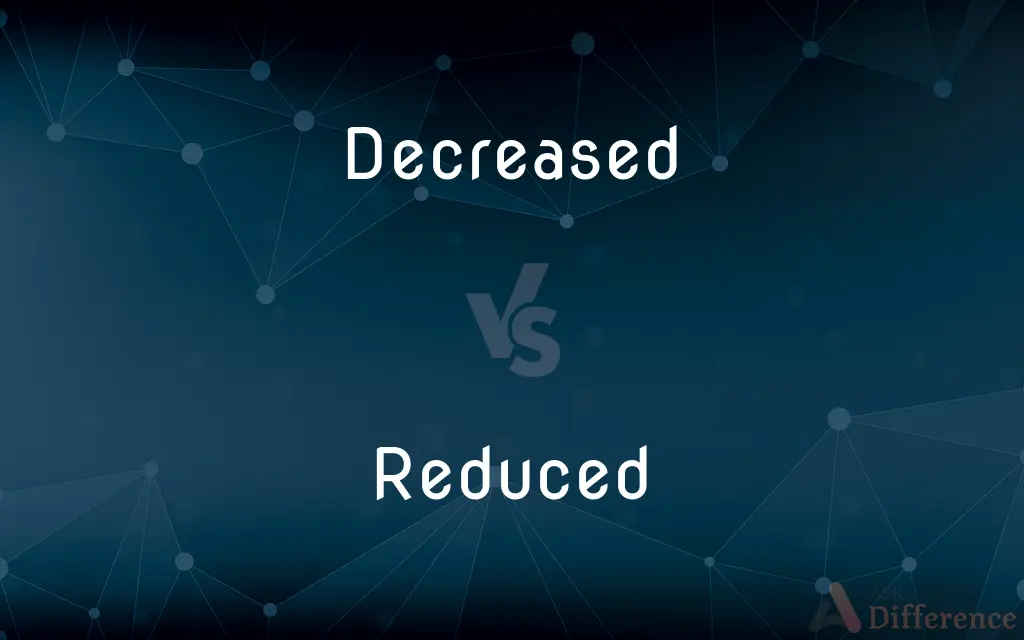Decreased vs. Reduced — What's the Difference?
By Tayyaba Rehman & Urooj Arif — Updated on April 4, 2024
Decreased emphasizes a decline in quantity or size, often observed or measured, while reduced highlights a deliberate action to make something smaller or less in amount.

Difference Between Decreased and Reduced
Table of Contents
ADVERTISEMENT
Key Differences
Decreased is used to describe a natural or observed reduction in numbers, levels, or intensity without specifying the cause or method. It implies a passive or automatic change. Reduced, on the other hand, usually involves an active effort or intervention intended to lower quantity, price, or intensity, suggesting a more controlled or intentional action.
While "decreased" often appears in contexts related to natural variations, statistics, or unintended changes, "reduced" is commonly found in scenarios involving human action to achieve a specific goal, such as cost-cutting or minimizing waste. This distinction underscores the passive versus active nature of the changes they describe.
In terms of usage, "decreased" is frequently associated with data, measurements, and scientific observations, where the emphasis is on the fact of diminution rather than the process. "Reduced," however, is used in contexts requiring an active decision-making process, such as sales, environmental strategies, or dietary plans, highlighting its association with deliberate choices.
Decreased can be used without implying a comparison to a previous state, simply noting a lower level or amount. "Reduced," conversely, often suggests a comparison to an original state or condition, emphasizing the effect of an action taken to cause the reduction.
In terms of connotation, "decreased" can carry a neutral or even positive tone depending on the context, such as when describing a decrease in crime rates or pollution. "Reduced," however, might imply a benefit or disadvantage, heavily influenced by the context, such as reduced prices being positive for consumers but potentially negative for sellers.
ADVERTISEMENT
Comparison Chart
Definition
To become smaller or less in size, amount, degree, or intensity
To make something smaller or less in size, amount, degree, or intensity through deliberate action
Nature
Often passive or observed change
Involves active effort or intervention
Context
Natural variations, statistics, scientific observations
Human actions, decision-making processes, strategies
Usage
Emphasizes the fact of diminution
Associated with deliberate choices and comparisons to an original state
Connotation
Neutral or contextually positive
Can imply both benefits and disadvantages depending on context
Compare with Definitions
Decreased
A reduction in intensity or severity.
Symptoms decreased after taking the medication.
Reduced
To diminish someone’s authority or status.
The king was reduced to a commoner after the revolution.
Decreased
To diminish in number or size.
The deer population has decreased over the past decade.
Reduced
To condense or simplify information.
The report was reduced to a one-page summary.
Decreased
To fall or drop to a lower level.
Water levels in the reservoir have steadily decreased.
Reduced
To lessen the strength or intensity.
The medication reduced the pain.
Decreased
Diminution in quantity or rate.
The amount of waste produced has decreased since the recycling program began.
Reduced
To lower the degree of complexity.
The process was reduced to a few simple steps.
Decreased
Lowering in degree or extent.
Interest in traditional TV has decreased with the rise of streaming services.
Reduced
To cut down on size, price, or amount deliberately.
Prices were reduced for the holiday sale.
Decreased
To become or cause to become less or smaller, as in number, amount, or intensity.
Reduced
To bring down, as in extent, amount, or degree; diminish.
Decreased
The act or process of decreasing.
Reduced
To gain control of; subject or conquer
"a design to reduce them under absolute despotism" (Declaration of Independence).
Decreased
The amount by which something decreases.
Reduced
To subject to destruction
Enemy bombers reduced the city to rubble.
Decreased
Simple past tense and past participle of decrease
Reduced
To bring to a specified undesirable state, as of weakness or helplessness
Disease that reduced the patient to emaciation.
Teasing that reduced the child to tears.
Decreased
Made less in size or amount or degree. Opposite of increased.
Reduced
To compel to desperate acts
The Depression reduced many to begging on street corners.
Decreased
Made less in size or amount or degree
Reduced
To lower in rank or grade; demote.
Reduced
To thicken or intensify the flavor of (a sauce, for example) by slow boiling.
Reduced
To lower the price of
The store has drastically reduced winter coats.
Reduced
To decrease the viscosity of (paint, for example), as by adding a solvent.
Reduced
To put in a simpler or more systematic form; simplify or codify
Reduced her ideas to a collection of maxims.
Reduced
To turn into powder; pulverize.
Reduced
To decrease the valence of (an atom) by adding electrons.
Reduced
To remove oxygen from (a compound).
Reduced
To add hydrogen to (a compound).
Reduced
To change to a metallic state by removing nonmetallic constituents; smelt.
Reduced
(Mathematics) To simplify the form of (an expression, such as a fraction) without changing the value.
Reduced
(Medicine) To restore (a fractured or displaced body part) to a normal condition or position.
Reduced
(Linguistics) To pronounce (a stressed vowel) as the unstressed version of that vowel or as schwa.
Reduced
To become diminished.
Reduced
To lose weight, as by dieting.
Reduced
(Biology) To undergo meiosis.
Reduced
Simple past tense and past participle of reduce
Reduced
Made smaller or less; having undergone reduction.
The reduced prices in a summer sale
Reduced
Discounted in price.
The reduced goods at the sale
Reduced
(cookery) Of a sauce etc.: made more concentrated.
The chicken was served in a reduced red wine sauce.
Reduced
Made less in size or amount or degree
Reduced
Well below normal (especially in price)
Common Curiosities
Can environmental factors be described as decreased or reduced?
Environmental factors can be "decreased" when referring to natural changes and "reduced" when human interventions are involved.
How do decreased and reduced relate to efficiency?
Decreased inefficiency or waste may not specify how, while reduced inefficiency implies deliberate actions were taken to achieve it.
Is reduced always intentional?
Generally, yes; "reduced" usually indicates a deliberate action to decrease something.
Is decreased always negative?
Not necessarily; the connotation depends on context, such as decreased pollution being positive.
Can reduced imply effortlessness?
Typically, "reduced" suggests deliberate action, though the effort involved may vary.
Can decreased and reduced be used interchangeably?
While they can be similar, their use depends on the context, with "decreased" implying a more passive change and "reduced" an active one.
Can decreased be used in financial contexts?
Yes, it can describe naturally occurring reductions, such as decreased revenue or profits.
How does technology affect decreased or reduced usage of resources?
Technology can lead to decreased usage through efficiency improvements or reduced usage through deliberate conservation strategies.
Can a person’s role or status be decreased?
Typically, one would say a person’s role or status is "reduced" to imply an active demotion or diminishment.
How does context affect the use of decreased vs. reduced?
The choice between the two often depends on whether the change is observed (decreased) or enacted (reduced).
Can actions be taken to decrease something, or is that reducing?
Actions taken to decrease something are typically described as reducing, given the intentional effort.
How do decreased interest rates affect the economy?
Decreased interest rates typically stimulate economic growth by encouraging borrowing and spending.
Is reduced pricing the same as discounted?
Yes, reduced pricing is a form of discounting, intentionally lowering prices to attract customers.
Does reduced have positive or negative implications in environmental discussions?
In environmental contexts, "reduced" often carries positive implications, such as reduced emissions or waste.
What does reduced mean in cooking?
In cooking, "reduced" means to thicken a liquid and concentrate its flavors by boiling.
Share Your Discovery

Previous Comparison
Helps vs. Help
Next Comparison
Either vs. WhetherAuthor Spotlight
Written by
Tayyaba RehmanTayyaba Rehman is a distinguished writer, currently serving as a primary contributor to askdifference.com. As a researcher in semantics and etymology, Tayyaba's passion for the complexity of languages and their distinctions has found a perfect home on the platform. Tayyaba delves into the intricacies of language, distinguishing between commonly confused words and phrases, thereby providing clarity for readers worldwide.
Co-written by
Urooj ArifUrooj is a skilled content writer at Ask Difference, known for her exceptional ability to simplify complex topics into engaging and informative content. With a passion for research and a flair for clear, concise writing, she consistently delivers articles that resonate with our diverse audience.













































